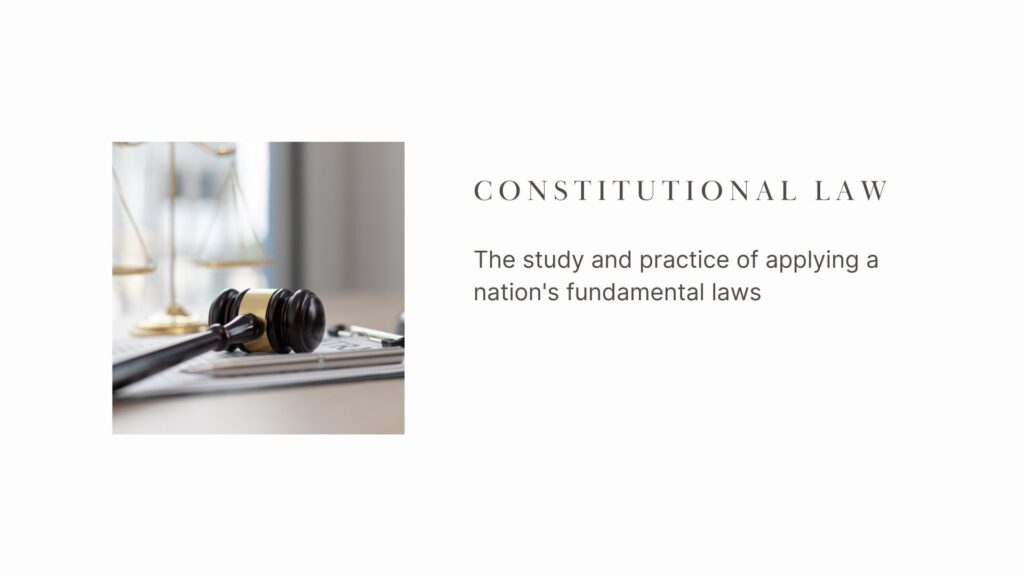What is Constitutional Law?
Constitutional law is a branch of law that focuses on the study, interpretation, and application of a constitution. It encompasses the principles, rules, and legal precedents that define and govern the structure and functions of government, the relationships between different branches of government, and the rights and liberties of individuals as articulated in the constitution.

Constitutional law plays a crucial role in ensuring the adherence to constitutional principles and protecting the fundamental rights and freedoms of citizens. Legal scholars, judges, and practitioners within this field analyze and apply constitutional provisions, addressing issues such as separation of powers, judicial review, federalism, and the protection of civil liberties.
Scholars’ definitions on constitutional law
John E. Nowak and Ronald D. Rotunda: “Constitutional law is the body of law concerned with the fundamental political institutions of a state and the interrelationship of the individual with the state.”
- Patrick Glenn: “Constitutional law is the set of rules that establish and regulate the institutions of government, and their relationships to one another and to the citizen.”
David M. Beatty: “Constitutional law consists of the principles, rules, and practices that are fundamentally concerned with the governance of the state.”
Joachim Jens Hesse: “Constitutional law encompasses the rules that regulate the formation and exercise of public power and that define the scope and limit of individual rights.”
Characteristics of Constitutional Law
Constitutional law has several distinct characteristics that set it apart from other branches of law:
Supremacy: Constitutional law is supreme within its jurisdiction. It takes precedence over all other laws, regulations, and government actions. Any law or action that conflicts with the constitution is generally considered null and void.
Foundational: Constitutional law serves as the foundational legal framework upon which a nation’s legal system and government structure are built. It outlines the fundamental principles and values of the state.
Interpretation: Constitutional law often involves the interpretation of constitutional provisions, which can be complex and subject to evolving understandings over time. Courts and legal scholars play a crucial role in interpreting and applying these provisions.
Rights Protection: A significant focus of constitutional law is the protection of individual and collective rights and liberties. It ensures that government actions do not infringe upon these rights, and it provides mechanisms for citizens to seek redress if their rights are violated.
Government Structure: Constitutional law defines the structure of government, specifying the powers, functions, and responsibilities of different branches of government, such as the executive, legislative, and judicial branches. It also addresses the relationship between federal and state governments in federal systems.
Amendment Process: Constitutions typically include provisions for amending or revising the constitution. These processes are usually more stringent than ordinary legislative procedures to preserve the stability of the constitutional framework.
Judicial Review: Constitutional law often includes provisions for judicial review, allowing the judiciary to assess the constitutionality of laws, government actions, and executive orders. This empowers the courts to ensure compliance with the constitution.
Longevity and Stability: Constitutional law is designed to provide long-term stability and endure over time. Constitutions are not easily changed, and the process for doing so is typically deliberate and thoughtful.
Legal and Political Significance: Constitutional law is not only a legal framework but also a political document that defines the organization of the state. It influences the functioning of government and the distribution of power.
Democracy and Citizen Participation: Many constitutional systems include provisions for democratic participation, such as rules for elections and representation, ensuring that citizens have a say in their government.
National Identity and Values: Constitutions may incorporate elements that reflect the nation’s cultural and historical identity, such as national symbols, mottos, or references to shared values.
Adaptability: Constitutional law can adapt to societal changes and new challenges, but the amendment process ensures that changes are made deliberately and in accordance with established principles.
These characteristics collectively define constitutional law as a foundational and dynamic area of law that plays a pivotal role in shaping a nation’s governance, protecting individual rights, and ensuring the rule of law.
Differences between Constitution and Constitutional Law
Constitution and constitutional law are related concepts, but they refer to different aspects of a nation’s legal and political framework. The main differences between those are as follows:
- Nature:
Constitution: The constitution is a written or unwritten document that serves as the supreme law of a country or organization. It lays out the fundamental principles, structure of government, and the rights and duties of citizens.
Constitutional Law: Constitutional law is a branch of law that deals with the interpretation, application, and practice of the constitution. It encompasses the body of legal principles, rules, and doctrines that are derived from or relate to the constitution.
- Content:
Constitution: The constitution is the actual text or set of fundamental laws that serves as the core of a nation’s legal system. It includes specific provisions and articles that define the government’s organization and powers, individual rights, and more.
Constitutional Law: Constitutional law includes the interpretation and analysis of the constitution’s provisions. It involves legal cases, precedents, and court decisions that clarify the meaning and application of constitutional principles.
- Scope:
Constitution: The constitution is a static, foundational document that outlines the basic framework and principles of governance. It remains relatively constant over time, with changes typically requiring a formal amendment process.
Constitutional Law: Constitutional law is dynamic and adaptable. It evolves as legal scholars, judges, and practitioners interpret and apply constitutional provisions to contemporary legal and political issues. This field is subject to ongoing development and refinement.
- Role:
Constitution: The constitution serves as the supreme law that governs a nation or organization. It provides the fundamental rules for the exercise of governmental power and the protection of individual rights.
Constitutional Law: Constitutional law plays a role in ensuring that the constitution is upheld and applied correctly. It guides the resolution of legal disputes, the interpretation of constitutional provisions, and the protection of constitutional rights.
In summary, the constitution is the foundational legal document, while constitutional law is the field of law that deals with the interpretation, application, and development of the principles and rules articulated in the constitution. Constitutional law is the means by which the constitution is brought to life and applied in the real world through legal practice and jurisprudence.
